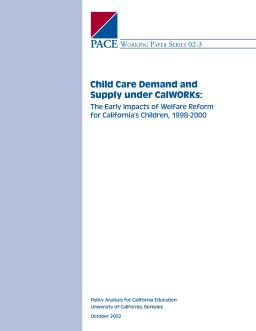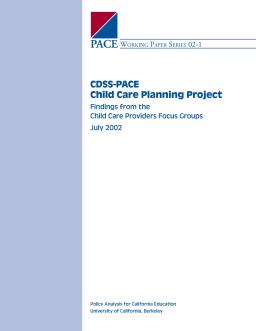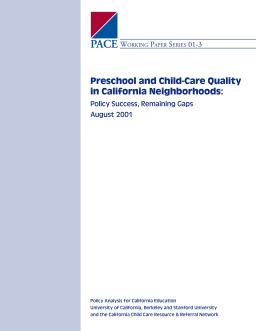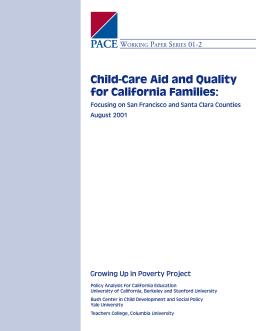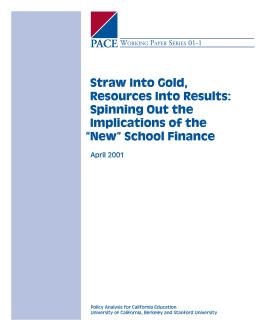The Early Impacts of Welfare Reform for California's Children, 1998–2000
Published
Summary
This report examines the effects of welfare-to-work and childcare capacity building on the childcare system in California, prompted by changes in the childcare system and welfare reform. The study was requested by the California Department of Social Services, and this paper provides an overview of the findings.
Descriptive Findings from the Child Care Subsidy Interview
Published
Summary
CDSS and PACE conducted a survey of CalWORKs participants in Kern, Orange, and Santa Clara counties, interviewing 1,974 individuals in three languages. This report presents demographic data and survey responses, including frequencies and select responses by county, language, and ethnic groups.
Findings from the Child Care Providers Focus Groups
Published
Summary
This report presents findings from PACE's study on how California's childcare subsidy system and CalWORKs program impact licensed and license-exempt childcare providers. Five focus groups were conducted in 1999 and 2000, with topics organized by providers' services, philosophies of care, operational issues, and opinions about the subsidy system. The report provides insight into the experiences of childcare providers across California, but does not claim to be representative of the industry.
Published
Summary
This report discusses an initiative by the California Children and Families Commission to expand the availability and quality of early care and education programs. The project includes recruiting and training early care providers, improving professional preparation, and implementing strategies to retain trained providers. The report provides information on existing training programs available to early childhood professionals and students, including accredited/non-accredited opportunities at community colleges, state universities, private colleges, and child care resource and referral agencies.
Policy Success, Remaining Gaps
Published
Summary
This paper analyzes the quality of center-based programs in diverse lower-income communities in California. The majority of centers displayed high levels of quality, and community conditions such as poverty levels and ethnic composition did not consistently influence quality. Public subsidies positively affected center quality, while the presence of more programs in a community may slightly lower quality due to increased demand for enrollment.
Focusing on San Francisco and Santa Clara Counties
Published
Summary
This report analyzes California's early childhood education programs and finds that attending public preschool programs improves school readiness and academic performance, particularly for low-income children. The study also shows that the economic benefits of preschool programs far outweigh the costs, including increased earnings and decreased need for remedial education and social services. Recommendations include expanding access to high-quality preschool programs for low-income children in California to reduce economic inequality.
Spinning Out the Implications of the 'New' School Finance
Published
Summary
The "new" school finance approach investigates how resources are used within schools and classrooms to enhance educational outcomes, rather than focusing solely on spending patterns. The report reviews literature on resource use in education and suggests that additional funding is not sufficient to improve outcomes. Research should analyze how resources are used within classrooms and schools. Policymakers should develop complementary reforms and enact categorical funding. The report warns that education expenditures keep expanding with little to show for them.
